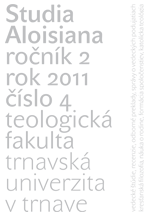Pohľad súčasného liberalizmu a katolíckej sociálnej náuky na spravodlivé usporiadanie spoločnosti
The View of Just Social Order according to Contemporary
Liberalism and Catholic Social Teaching
Author(s): Martin CsontosSubject(s): Ethics / Practical Philosophy, Political Philosophy, Social Philosophy, Theology and Religion
Published by: Teologická fakulta Trnavskej univerzity
Keywords: John Rawls; liberalism; justice; political philosophy; catholic social teaching; capitalism; socialism; democracy;
Summary/Abstract: There seems to be a big gap between catholics and liberals concerning their social philosophy and worldview in general. Catholics often consider liberals relativist, permissive and agnostic while many liberals see catholics as out of date and blindly subordinate to the authority of Church. The aim of this article is to try to examine if and to what extent it is possible to reconcile these traditions. My focus is on their social and political philosophy, more precisely on the question of justice and just society. However, liberalism and catholic social thought are too broad traditions to consider them in general. That is why I have chosen John Rawls as a prominent proponent of contemporary liberalism and cardinal Joseph Höffner and the late pope John Paul II as representants of catholic social thought and compared their views. Given the limited space, the scope of questions I deal with in this article is limited as well. Basically I am concerned with four topics: 1. Social nature of man and individualism, 2. democracy, truth and transcendence, 3. socialism vs. capitalism, 4. social justice and social love. The resulut of my inquiry is that in spite of enduring differences, catholic social thought and rawlsian liberalism are much closer than it could seem at first sight and that the dialogue between them is not only desirable but possible as well.
Journal: Studia Aloisiana
- Issue Year: 2/2011
- Issue No: 4
- Page Range: 61-73
- Page Count: 13
- Language: Slovak

